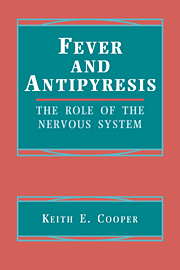Book contents
- Frontmatter
- Contents
- Preface
- Acknowledgements
- Glossary of acronyms
- 1 Fever – definition, usefulness, ubiquity
- 2 Thermoregulation – an outline
- 3 The nature of pyrogens, their origins and mode of release
- 4 The loci of action of endogenous mediators of fever
- 5 Beyond the loci of action of circulating pyrogens: mediators and mechanisms
- 6 The role of the cerebral cortex, the limbic system, peripheral nervous system and spinal cord, and induced changes in intracranial pressure
- 7 Antipyresis
- 8 Febrile convulsions in children and a possible role for vasopressin
- 9 A synthesis, predictions and speculations from my armchair
- Appendix 1 Anatomical considerations
- References
- Index
9 - A synthesis, predictions and speculations from my armchair
Published online by Cambridge University Press: 10 September 2009
- Frontmatter
- Contents
- Preface
- Acknowledgements
- Glossary of acronyms
- 1 Fever – definition, usefulness, ubiquity
- 2 Thermoregulation – an outline
- 3 The nature of pyrogens, their origins and mode of release
- 4 The loci of action of endogenous mediators of fever
- 5 Beyond the loci of action of circulating pyrogens: mediators and mechanisms
- 6 The role of the cerebral cortex, the limbic system, peripheral nervous system and spinal cord, and induced changes in intracranial pressure
- 7 Antipyresis
- 8 Febrile convulsions in children and a possible role for vasopressin
- 9 A synthesis, predictions and speculations from my armchair
- Appendix 1 Anatomical considerations
- References
- Index
Summary
In 1798, James Currie wrote in his book Medical Reports on the Effects of Water, Cold and Warm, as a Remedy in Fever and other Diseases – ‘The great difficulty which men have in all ages experienced in the acquisition of knowledge, has arisen from the promptitude of the human mind to decide in regard to causes. To the weak and ignorant, presumption is as natural as doubt is intolerable, and with such, belief is almost always a creature of the imagination. Nor is this peculiar to weakness and ignorance: to retain the mind unprejudiced and undecided in the investigation of striking and interesting phenomena, till by the painful steps of induction, the hidden cause is revealed, is an effort of the most difficult kind, and requires the highest and rarest powers of the understanding. The records of every part of science, bear ample testimony to this truth, particularly the records of medicine, and in a still more special manner that part of medicine which treats of the nature of fever. The most eminent physicians in every period of the world, impatient of observing and delineating, have been eager to explain and even to systematize; and the science of life owes its corruptions more to the misapplication of learning, than even to the dreams of superstition.’
- Type
- Chapter
- Information
- Fever and AntipyresisThe Role of the Nervous System, pp. 133 - 143Publisher: Cambridge University PressPrint publication year: 1995



